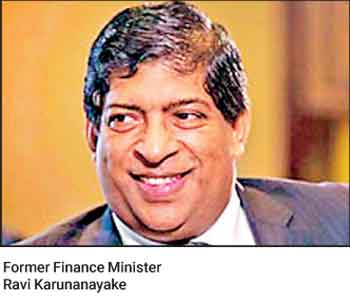Tuesday Feb 24, 2026
Tuesday Feb 24, 2026
Saturday, 20 January 2024 01:28 - - {{hitsCtrl.values.hits}}
 Former Finance Minister Ravi Karunanayake yesterday stressed that the Government has the right to take corrective actions in light of new developments and difficulties in the implementation of the reform program and adjusting any International Monetary Fund (IMF) condition which is detrimental to the country. When a country borrows from the IMF, the Government agrees to adjust its economic policies to overcome the problems that led it to seek financial assistance.
Former Finance Minister Ravi Karunanayake yesterday stressed that the Government has the right to take corrective actions in light of new developments and difficulties in the implementation of the reform program and adjusting any International Monetary Fund (IMF) condition which is detrimental to the country. When a country borrows from the IMF, the Government agrees to adjust its economic policies to overcome the problems that led it to seek financial assistance.
These policy adjustments are conditions for $ 3 billion IMF Extended Fund Facility (EFF) and help to ensure that the country adopts strong and effective policies.
Karunanayake said the IMF staff technical team now conducts periodic program reviews to assess whether it is on track or needs to be adjusted in light of new developments.
He opined that Sri Lankan top officials involved in negotiations with the IMF have now been given an opportunity to take corrective actions relating to current monetary or fiscal policies stipulated in the reform program if they are detrimental to the country.
It has to be done in consultation, consensus and compromise with the IMF staff team now in the island on a fact finding mission to discuss recent developments and follow up on reform program targets and commitments, Karunanayake claimed.
Karunanayake who successfully negotiated a loan of $ 1.5 billion from the IMF in 2016 to boost foreign exchange reserves and avert a balance of payments problem, noted that Central Bank and Finance Ministry officials should be able to negotiate the best possible conditions for the country.
However he opined that the responsibility of these high level officials to bring to the notice of the visiting IMF staff team on public concerns relating to tax reforms such as VAT hike and high cost of living while suggesting corrective actions.
Expressing his view on the new taxation system, he emphasised that it has to be independent of IMF recommendations and fairer by rich and the middle class alike considering their earning capacity without burdening the poor via indirect taxes.
The Inland Revenue department announced last week that it collected a record tax revenue of Rs. 1.55 trillion in 2023, which was 104% than the revenue target set.
Karunanayake claimed that the Government is persistently addressing the impact of the Value Added Tax (VAT) revision with the exclusion of additional taxes on goods and services under VAT and implementing necessary tax adjustments.
According to Karunanayake, a 3% hike in value added tax (VAT), would finance the Rs. 10,000 salary increase of public sector employees numbering around 1.3 million.
Missed structural benchmarks and indicative targets are assessed in the context of overall program performance by the current IMF mission.
Sri Lanka has to expedite the public debt restructuring process and implementation of Government’s ambitious reform program supported by the IMF for the recovery and rebound of the country’s economy,
As part of the IMF-supported extended fund facility arrangement, Sri Lanka has undertaken significant reforms to pave the way out of a deep economic and debt crisis.
The economy is showing tentative signs of stabilisation, supported by rapid disinflation and a significant fiscal adjustment.
Measures are being taken to rebuild fiscal credibility and to improve governance and reduce corruption vulnerabilities.
The authorities reached agreements in principle with official creditors on debt treatments consistent with program parameters and are in good faith discussions with their private creditors.
The economy has begun the transformation from primarily agriculture to higher value added industry and service sectors and has the potential to further diversify and upgrade its economic structure.
As of now, the Sri Lankan economy relies primarily on tourism, tea export, clothing, rice, and other agricultural production.